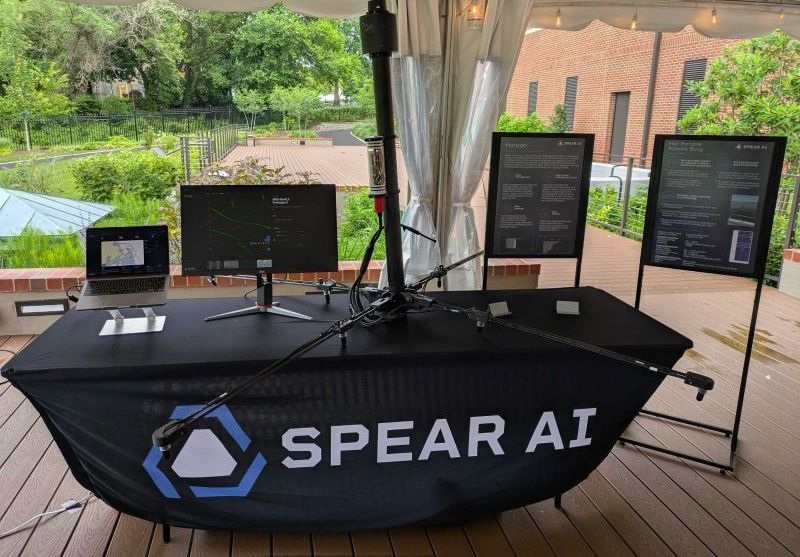Navy Veterans’ Startup Spear AI Raises $2.3M, Wins $6M Navy Contract to Revolutionize Underwater Surveillance with AI

A defense tech startup founded by two US Navy veterans has emerged as a potential game-changer in the murky world of undersea surveillance.
Washington-based Spear AI, launched in 2021 by Michael Hunter, a former Navy SEAL analyst, and John McGunnigle, a retired nuclear submarine commander, has landed its first external funding and secured a $6 million contract from the US Navy to enhance submarine detection systems using artificial intelligence.
The company specializes in interpreting passive acoustic data — underwater sound collected by hydrophones and other listening devices — a domain that has long been a challenge for naval forces due to the difficulty of distinguishing benign environmental sounds from potential military threats. Traditional AI systems, typically trained on labeled image or text data, struggle in this setting because underwater acoustic data is mostly unstructured and unlabeled.
Register for Tekedia Mini-MBA edition 18 (Sep 15 – Dec 6, 2025) today for early bird discounts. Do annual for access to Blucera.com.
Tekedia AI in Business Masterclass opens registrations.
Join Tekedia Capital Syndicate and co-invest in great global startups.
Register for Tekedia AI Lab: From Technical Design to Deployment.
Spear AI addresses this with a combination of hardware and software. Its solution includes deployable sensors that can be attached to buoys or vessels, along with proprietary AI-driven software that labels and organizes acoustic data, enabling advanced machine learning models to extract actionable intelligence from what would otherwise be an ocean of noise. The system helps operators differentiate between the sound of a pod of whales and a silent-running submarine — a vital distinction in high-stakes naval operations.
The recently awarded $6 million Navy contract focuses on deploying Spear AI’s data-labeling tool, designed to support more accurate threat classification and improve the speed at which crews can respond to evolving underwater risks. It’s a critical capability at a time when rival powers are stepping up submarine deployments, and information asymmetry under the sea remains a major vulnerability for naval forces.
In parallel, Spear AI announced a $2.3 million seed funding round backed by venture capital firms with a focus on artificial intelligence and national defense technologies. The capital will fuel the company’s growth, including a planned expansion of its 40-person workforce, which the founders say will double in the coming months. This growth will enable Spear AI to accelerate the deployment of its tech and expand its scope of applications.
Hunter and McGunnigle say they deliberately avoided raising money or chasing contracts until they had built a product capable of solving real-world problems.
“We wanted something that could deliver immediate value to operators,” Hunter said. “Then we’d go out for funding — not the other way around.”
Beyond military use, Spear AI is exploring commercial applications, including monitoring undersea infrastructure like oil pipelines and subsea internet cables — areas increasingly targeted by sabotage or requiring enhanced monitoring due to their strategic importance.
The startup is also looking to offer consulting services, aligning itself with business models used by defense tech companies like Palantir. This approach would allow Spear AI not just to sell tools but to help clients, both military and civilian, embed AI capabilities into their operations, particularly in complex, high-risk environments where accuracy and reliability are critical.
However, this further underlines the growing use of AI to increase warfare capabilities, a development in the AI arms race that has gotten in the way of a unanimous global safety guardrail. The U.S. has repeatedly expressed concerns about China’s potential in developing super military technologies powered by AI, prompting Washington’s restrictions on some chip exports to China.
China has condemned the U.S. stance. Chinese Premier Li Qiang warned on Saturday during the annual World Artificial Intelligence Conference (WAIC) in Shanghai that artificial intelligence development must be weighed against the security risks, adding that global consensus was urgently needed.
“The risks and challenges brought by artificial intelligence have drawn widespread attention … How to find a balance between development and security urgently requires further consensus from the entire society,” the premier said.
With global tensions on the rise and the Pentagon pushing to modernize its forces, startups like Spear AI are expected to play a growing role in reshaping 21st-century defense strategies. And in domains like undersea warfare — where surveillance has historically lagged due to technical limitations — the company’s AI-first approach could redefine how threats are detected and neutralized.



